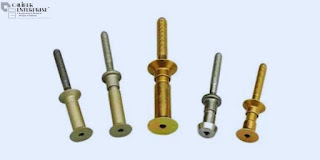Grub Screw Vs Regular Screw - Difference between a grub screw and a regular screw?
When working on tasks that involve connecting two components together, such as furniture assembly, it is critical to select the appropriate screw to provide a secure and sturdy result. Grub screws and ordinary screws are the two most often utilised screw types in these projects. At first sight, they appear to be similar. However, there are some significant distinctions between the two. In this blog article, we'll look at the differences between grub screws and ordinary screws, including their distinctive features, uses, benefits, and drawbacks.
Caliber Enterprises is a renowned Screw Manufacturer in India. We provide a variety of screws, including nylon screws, hex screws, leg screws, CSK slotted screws, pan Phillips screws, and cheese head screws. As a leading Screws Supplier, we provide Screws in various regions of India and export our extensive selection of Screws around the world.
What is a Grub Screw?
A grub screw, also known as a set screw, is a screw with no head that is typically used to hold two components together. Instead of a head, the grub screw has a hexagonal socket or Allen key. The socket allows you to tighten or loosen the screw by twisting it using an Allen wrench. Grub screws come in a variety of threads, lengths, sizes, and materials, including stainless steel, brass, and zinc-plated steel.
What is a Regular Screw?
A standard screw consists of a head, a shank, and a threaded body. The head might be flat, oval, or dome-shaped. The unthreaded shank of the screw controls its length, but the threaded body cuts into the material and provides gripping power. Regular screws are made of many materials, including stainless steel, brass, and galvanised steel, and come in a variety of diameters, lengths, and thread patterns. If still have doubts, visit Screw Suppliers in India.
Advantages of Grub Screws:
They're simple to use and install.
They are discrete and take up little space.
They are perfect for usage in small locations when access is limited.
They can withstand a high axial load, ensuring a stable and secure connection.
The primary drawback of grub screws is that they are not resistant to rotation and may be readily removed by an external force unless they are put in a recess or drilled hole.
Advantages of Regular Screws:
They have excellent bearing strength and can resist heavy loads.
They are resistant to rotation and can withstand lateral pressure.
They can be easily removed with a screwdriver.
However, regular screws have significant drawbacks, most notably their relatively large diameter, which can create noticeable holes and damage the material to which they are connected.
Applications of Grub Screws:
Grub screws are widely employed in a variety of sectors, including electronics, automotive, equipment, and furniture assembly, to attach components. They are excellent for generating a flush, inconspicuous surface and are frequently utilised when appearance and accessibility are critical. Grub screw uses include attaching gears to shafts, securing bearings in place, and connecting pipes and fittings.
Applications of Regular Screws:
Regular screws are used in a wide range of applications, from household repairs to manufacturing processes. They can fasten wood, metal, plastic, and other materials together. Some examples of regular screw applications include securing hinges, attaching furniture legs, installing shelf brackets, and assembling electronics.
When to Use Which Screw?
Choosing the right screw is mainly determined by the individual use, the material to which it is fastened, and the level of stability necessary. A grub screw is a subtle, visually pleasing fastener that works best in confined locations. If you need muscular bearing strength, resistance to rotation and lateral pressure, and don't mind visible holes, a standard screw is a superior choice.
Cities we supply Fasteners:
Fasteners Manufacturers in Rajkot
Fasteners Manufacturers in Pune
Fasteners Manufacturers in Gujarat
Fasteners Manufacturers in Rohtak
Fasteners Manufacturers in Kolkata
Conclusion:
In conclusion, while grub screws and regular screws may appear similar, they offer unique advantages and disadvantages depending on the application at hand. It’s important to consider all the factors when deciding on the appropriate screw for your project. Constantly evaluate the material you are fastening, the strength required, and your desired appearance. With this information, you can confidently choose from either grub screws or regular screws and achieve a secure and stable outcome.
Product Source: Screw Manufacturer
Also visit: Fasteners Manufacturer in India
.jpg)
.jpg)


Comments
Post a Comment